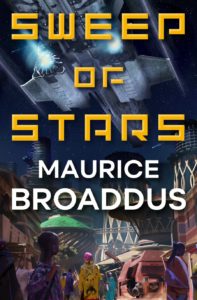
It’s easy to get stuck in a cycle of just reading the buzziest of the new releases, but I like to make sure I’m also reading work that’s more off the beaten path—after all, my favorites list is littered with books that never got the hype they deserve. So when a friend raved about Maurice Broaddus’ Sweep of Stars, I gave it a look. And when I saw the ambition of the project, I gave it a try.
Sweep of Stars opens an Afrofuturist space opera centered around Muungano, a community rooted in the people and culture of West Africa that became a scientific and cultural leader in our solar system, setting an example of what was possible while the people of Original Earth tore each other apart in a brutal series of religious wars. But Muungano must now execute a smooth transition of leadership while both protecting themselves from violent factions on Original Earth and ensuring that a mysterious wormhole does not in fact pose a threat.
There’s a lot going on from a worldbuilding and plot perspective, and even more on the character side. Multi-POV epics always have a choice between starting with a small cast of main characters and expanding as the plot requires, or starting with a very large cast and narrowing focus as needed. And Sweep of Stars emphatically chose the latter. The first six chapters introduce six different points-of-view, building to a total of ten perspective characters over the course of the 240-page novel, with the most central characters getting just five or six chapters apiece of the 29 in total.
It reads like a conscious decision to reflect the values of Muungano in the structure of the narrative. There is no one hero, no one indispensable leader, but rather a group working together towards a common goal. But ambitious and admirable as the theme may be, it’s difficult for a reader new to the world to take in so many key perspectives so quickly. To the novel’s and the author’s credit, the chapter-level writing is excellent, so that each character comes with their own goals and challenges, and each section ends with a hook that leaves the reader ready for more. But it’s not unusual to go several chapters between a hook and a return to that storyline, and even though they may have relatable motivations and struggles, it can be easy for some of the characters to run together when given just a chapter or two of focus.
The plot suffers from a similar problem of trying to do so much that each element doesn’t have the impact it should. We know from the beginning that there are factions seeking to undermine Muungano, but various plot threads are spread thinly over what is fairly short for the start of such an ambitious project. And with the setup spread thin, the payoff just doesn’t have the emotional impact that it should.
Alongside having trouble immersing with so much information so quickly was another intentional choice that pulled me out of the story: the decision to use contemporary slang. There is an explicit, in-universe fascination with late 20th century culture that explains the regular allusions to rap or hip-hop lyrics. And to that extent, it doesn’t bother me too much. But I rarely read a futuristic sci-fi tale using contemporary slang that doesn’t hit a point where it just feels like too much and begins to break my immersion, and I definitely hit that point here with soldiers making Tinder references. It’s not really something to make or break a story, but for me, it’s an impediment.
So after a few paragraphs of complaints, you’d get the impression that I really disliked Sweep of Stars. But that’s not true—there was a lot that I thought worked very well! Each chapter exposed the heart of the perspective character in a way that made it easy to invest, even with new figures every 10-15 pages. And there were intriguing plot hooks from the absolute start. My complaints about the characters and plot had to do with the balance between setup and payoff, but not the quality of the setup. Sweep of Stars is a book that hooks you fast, and even if I felt some of the payoff was rushed, there were still hard-hitting emotional moments near the end.
All told, this is a book that I think could’ve benefitted from significantly more length. It opens an ambitious project and hits so many of the right notes as a series-starter, but the balance between telling its own story and opening a bigger story never quite comes into equilibrium. There’s not quite enough payoff, and what we do see feels like it comes earlier than it should. Overall, it’s a story that I expect will be better as a series than as a book. But even as a book, there’s still plenty of good.
Recommended if you like: space opera, Afrofuturism, multi-POV epics.
Can I use it for Bingo? It’s a 2022 Publication by a BIPOC Author that’s Set in Space and Features a Revolution or Rebellion.
Overall rating: 14 of Tar Vol’s 20. Four stars on Goodreads.
